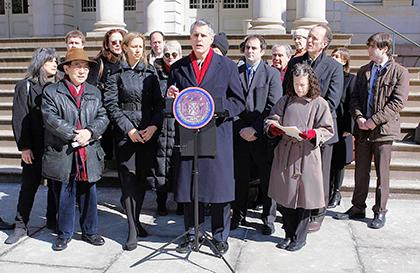By Anna Gustafson
City Councilman James Gennaro (D-Fresh Meadows) and other New York officials cheered a decision by the state last week that would make it difficult for any company to drill in the upstate area that supplies drinking water to about 9 million residents in the city and Westchester County.
State Department of Environmental Conservation officials announced Friday they will place new restrictions on drilling in the upstate watershed, a site where Gennaro and other city officials had been concerned drilling could occur and potentially contaminate residents’ drinking water.
The state Legislature passed a law in July 2008 that allowed wells tapping into gas deposits across New York to be located more closely to one another than previously permitted, making it economically feasible for companies to launch wide-scale drilling near the drinking water reservoirs.
Last week’s “announcement is the culmination of two years of advocacy by the City Council and other critical stakeholders that the purity of New York City’s priceless and irreplaceable drinking water supply should never be placed at risk for a short-term infusion of natural gas revenues or for any reason,” Gennaro said.
The state did not completely ban drilling, but officials said any application to drill using “high-volume horizontal drilling” in the watershed will require a case-by-case environmental review process. Officials said this cumbersome process will likely deter companies from trying to drill in the watershed.
The high-volume drilling, otherwise known as hydraulic fracturing, or hydrofracking, is a process of extracting natural gas that entails injecting up to 5 million gallons of water laced with chemicals into the ground at high pressure to break the rock.
The method has been criticized by city government officials and environmentalists who often cite a 2008 report from the U.S. Land Management Bureau that stated groundwater in Sublette County, Wyo., which has one of the country’s largest natural gas fields and where hydraulic fracturing was commonly employed, was contaminated with benzene, a substance that has been linked to cancer and nervous system disorders.
“The city commissioned a study last year to analyze the impacts of hydrofracking in the watershed and found that this technique poses a significant threat to the quality of the water supply that 9 million New Yorkers rely on every day,” Mayor Michael Bloomberg said. “We firmly believe, based on the best available science and current industry and technological practices, that drilling cannot be permitted in the city’s watershed. We are confident that the additional reviews now required for any drilling proposal in the watershed will lead the state to that same conclusion.”
DEC Commissioner Pete Grannis said the additional reviews are meant to better protect the city’s unfiltered water supply.
The city’s watershed is “unique in the level of management required to ensure continued compliance with strict water quality standards,” state Health Commissioner Richard Daines said.
“DEC is taking significant action to protect these watersheds,” Daines said.
Reach reporter Anna Gustafson by e-mail at agustafson@cnglocal.com or by phone at 718-260-4574.



































